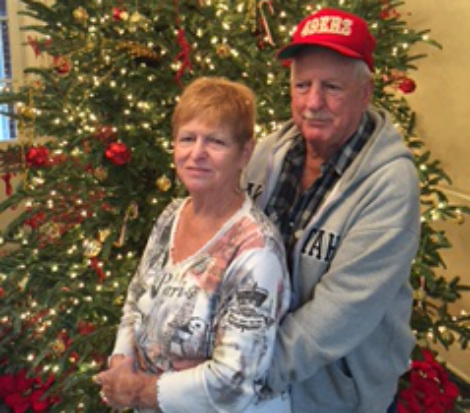Mesothelioma Survivor: Ojibwa Tea ‘Keeping Me Alive’
Stories from SurvivorsWritten by Tim Povtak | Edited By Walter Pacheco

Mesothelioma survivor Linda Foreman doesn’t go anywhere now without her Ojibwa tea.
It gives her hope — and life, she believes.
Foreman, 77, believes the Native American four-herb tea has been instrumental in fighting off the peritoneal mesothelioma cancer progression.
“This tea is what’s keeping me alive. I really believe that,” she told Asbestos.com from her home in southern Oregon. “My doctor is surprised at how well I’m doing now. All the doctors I saw originally — about six of them — gave me no more than a year to live, and I’m still here.”
The U.S. Food and Drug Administration hasn’t approved Essiac tea for the treatment of mesothelioma. It listed the Ojibwa brand of Essiac tea on a list of fake cancer cures that consumers should avoid in 2009. Patients interested in using it as a supplemental treatment should consult their doctor first.
Doctors diagnosed Foreman in August 2015. They gave her the typical grim prognosis and told her surgery was not an option. The cancer has no definitive cure, leaving patients with a life expectancy of 9-18 months.
She underwent six weeks of chemotherapy, but it did little to halt the cancer growing in her abdomen.
“I had never heard of mesothelioma,” she said. “I came home and just cried after I was told, but then I started looking around to see what was out there.”
First Used by Ojibwe Indian Tribe
Her stepdaughter convinced her to try this unusual blend of Essiac tea, which first came to light when Rene Caisse, an old-school Canadian nurse, started using it with cancer patients in the 1920s.
Caisse spent much of her life seeking medical validation for the tea’s cancer-fighting properties, but medical research has not supported claims that the tea cures cancer. Some studies found that it promoted cancer growth rather than control it.
The Ojibwa brand of Essiac tea is named after the Ojibwa Indians in Canada who often used medicinal herbs to treat their sick — more than a century ago.
The blend includes burdock root, slippery elm inner bark, turkey rhubarb root and sheep sorrel root, leaf, stems and seeds.
Although there is no scientific evidence that the tea can stop cancer, the herbs in the mix do contain considerable antioxidants known to stimulate immune system cells.
“I don’t think the doctors understand it, but they do tell me, ‘Whatever you’re doing now, keep doing it,’” she said. “I might be wrong, but I’m not going to quit drinking the tea to find out if I am. I don’t care what I’m doing now, or where I’m at. I’ve got that tea with me. I believe in it.”
Foreman Still Enjoys Happy Hour
Foreman lives with her husband, and they spend their winters in Yuma, Arizona.
She has a regular oncologist in both cities. She still gets regular CT scans, and with a port still in her side, she has fluid drained from her abdomen regularly. Yet the tumors have not progressed since she started drinking the tea 18 months ago.
She drinks it religiously twice each day on an empty stomach.
“I still feel pretty good most of the time. I have some trouble breathing. I’ve slowed a lot and have my aches and pains, but I’m 77 years old,” she said. “I still try and do everything that my friends do.”
She still plays golf, something she has done most of her life, although she usually stops after nine holes. She and her friends regularly make visits to the Napa Valley vineyards in Northern California.
She walked the Las Vegas strip to see two shows in one night. She went zip-lining through the mountains in Belize, where their cruise ship had stopped for a day. She couldn’t stand the thought of being left behind.
“It was beautiful, but the hardest part was the hike up the mountain,” she said. “Getting down was easy.”
She goes shopping with her daughter who lives close. She is a regular at the local happy hour, too, and is invigorated by the socializing.
“I don’t drink, but I still go all the time. I’m just as much fun not drinking as my friends are drunk,” she said. “You don’t have to be crazy to get crazy. And I can still party hardy.”
Returning to Winter Home in Arizona
As usual, they will leave for Yuma in late October, but she will leave wondering if she is closing the door to their home for the last time. It’s always in the back of her mind.
Doctors have told her the cancer could return at any time — and return with a vengeance.
“Last time I went back to Arizona and walked into the doctor’s office, his mouth dropped open. He couldn’t believe how healthy I still looked,” she said. “I don’t think he ever thought he’d see me again. Most people who I meet still can’t even tell that I have this problem.”
Foreman also takes a teaspoon of baking soda each day, theorizing that the alkalinity discourages cancer growth. She takes amygdalin, which is known as a controversial, natural form of chemotherapy. Neither has been medically proven to help fight cancer, but they are part of her routine.
“[Doctors] won’t even blink an eye when I tell them about it,” she said. “It’s weird, but it’s working. I’ve still got [mesothelioma], but it’s not growing. It has not changed at all. And I’m going back to Arizona.”




